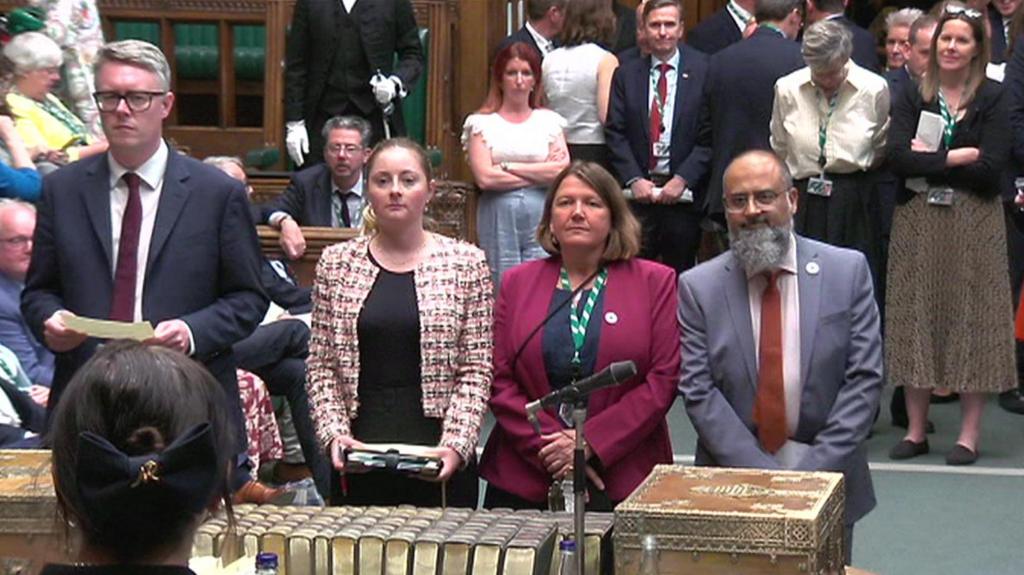“`html
The government’s benefits bill has been approved by MPs, following significant amendments last week in response to opposition from Labour backbenchers.
The Universal Credit Bill is anticipated to be classified as a money bill, potentially enabling it to become law within a month, irrespective of approval from the House of Lords.
The approved measures include adjustments to the health-related component of Universal Credit for certain claimants, while also ensuring that other elements of the benefit increase at a rate exceeding inflation.
Originally, the bill proposed stricter eligibility criteria for the Personal Independence Payment. However, following objections from Labour MPs, these changes have been retracted for current claimants and temporarily suspended for future applicants.
The Personal Independence Payment (PIP) is allocated to individuals with long-term physical or mental health conditions, independent of their savings or income.
In contrast, Universal Credit (UC) is means-tested and designed to provide support to unemployed or low-income individuals.
In advocating for the bill’s passage, Disabilities Minister Sir Stephen Timms stated, “If you can work, you should. If you need assistance finding work, the government should provide it. And those who are unable to work must be able to live with dignity.”
“These are the principles underpinning what we’re doing.”
The government projects that nearly four million households will experience an income boost of £725 over the next five years as a result of the increase in the Universal Credit standard allowance.
Despite the government’s concessions last week, 47 Labour MPs voted against the legislation, supporting a rebel amendment proposed by York MP Rachael Maskell.
During a debate preceding the final votes, Maskell described the bill as an “omnishambles” that would lead to varying levels of UC for individuals depending on whether they applied before or after April 2026.
She questioned whether an individual who previously received Universal Credit but no longer qualified due to improved health would receive a lower rate upon reapplying after a relapse, compared to their previous benefit level.
Sir Stephen assured that the bill already safeguards individuals in the scenario described by Maskell.
Nevertheless, Maskell proceeded with her amendment, which aimed to ensure that individuals with fluctuating medical conditions receive the existing rate of UC, rather than the lower rate applied to new claimants. It was defeated by a vote of 334 to 149.
The Conservatives also introduced an amendment that proposed further changes, including reducing payments for individuals with less severe mental health conditions and excluding certain foreign nationals from specific benefits.
It was defeated by a vote of 416 to 103. In the final vote, MPs approved the bill by a margin of 336 votes to 242.
The changes to Universal Credit will be implemented across the UK, while any measures concerning PIP will apply in England, Wales, and Northern Ireland.
In order to secure the bill’s passage last week, ministers were compelled to make last-minute concessions, including announcing that stricter eligibility rules for new PIP claimants would be postponed until a review of PIP assessments had been completed.
The review, scheduled to conclude in autumn 2026, will be led by Disabilities Minister Sir Stephen Timms and co-produced with disabled individuals and the organizations that represent them.
During Wednesday’s debate, several Labour MPs urged the government to enhance the role of disabled individuals in the review.
Labour MP Marie Tidball emphasized that their involvement in the Timms review should be “meaningful and not performative.”
Another Labour MP, Stella Creasy, suggested that disabled organizations should possess veto power over any recommendations made by the review.
Prior to the commencement of the MPs’ debate, a United Nations panel expressed concerns regarding the potential impact of the government’s proposals on disabled individuals.
In a letter addressed to the Department for Work and Pensions, the UN’s high commissioner inquired about measures to “address the foreseeable risk of increasing poverty rates amongst persons with disabilities if cuts are approved.”
The government initially estimated that the bill would generate savings of £5 billion per year by 2030; however, the concessions made to ensure its passage have virtually eliminated those savings.
Last week, Chancellor Rachel Reeves was questioned about whether the changes would result in tax increases. She declined to “speculate” but added, “Of course, there is a cost to the welfare changes that Parliament voted through this week, and that will be reflected in the Budget.”
Sign up for our Politics Essential newsletter to read top political analysis, gain insight from across the UK and stay up to speed with the big moments. It’ll be delivered straight to your inbox every weekday.
Check whether your MP voted for or against the Universal Credit and Personal Independence Payment Bill
Joshua Reeves has cerebral palsy and fears welfare changes will cause a “two tier benefit system”.
Plans to help those affected by benefits cuts into work are not “properly considered”, officials tell the BBC.
Young disabled people may soon see their Universal Credit top-up cut as part of wider welfare reforms.
Sir Sadiq Khan has said the cuts would destroy the financial safety net for disabled Londoners.
“`

